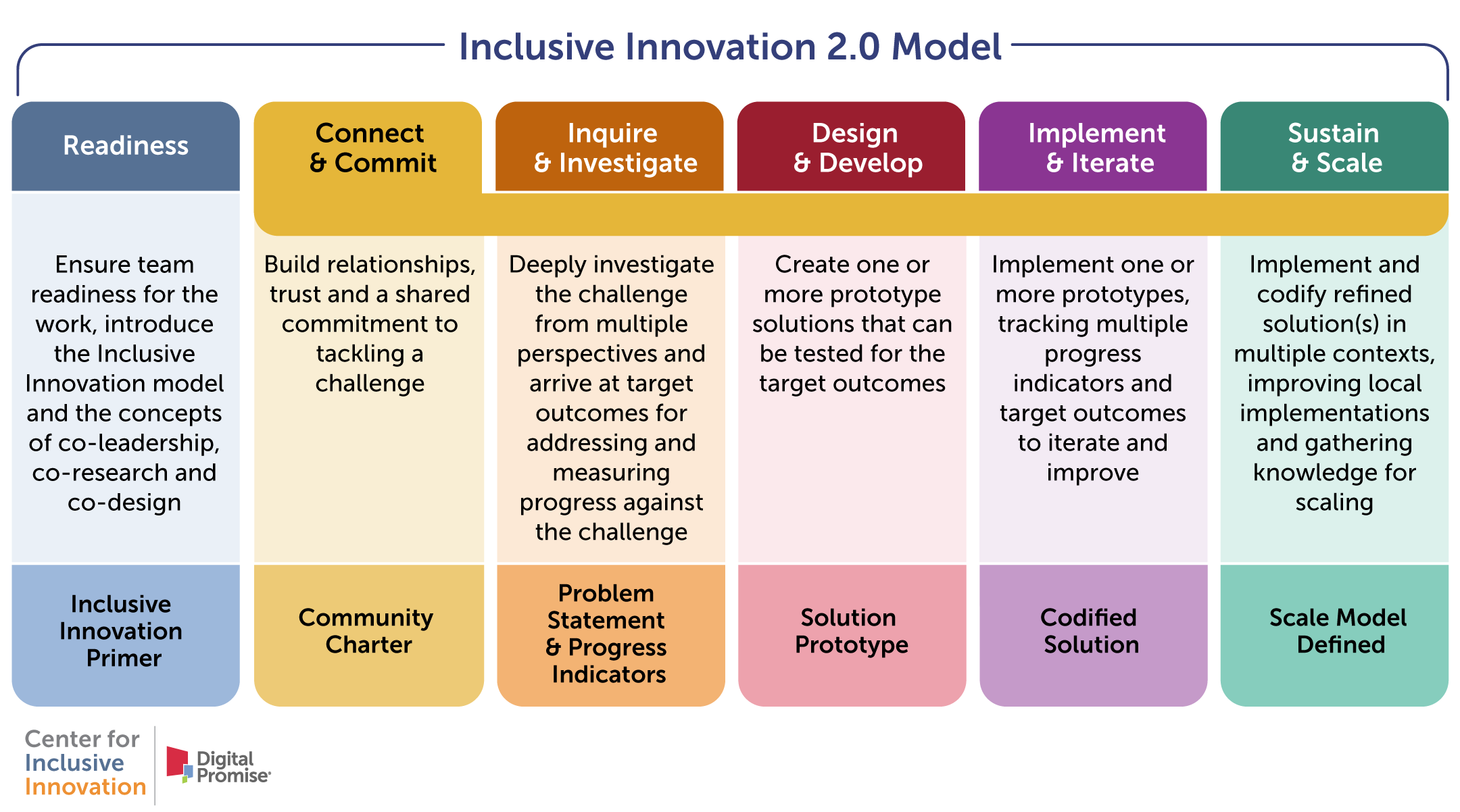Inclusive Innovation is a research and development (R&D) model that improves education by supporting communities and schools in co-designing innovative solutions. Inclusive Innovation starts by ensuring those closest to the challenge—including students, parents, families, and organizers—are at the table with district leaders, educators, researchers, and solution developers and intentionally involved in co-research and co-creation.
Inclusive Innovation is an investment in your community and an opportunity to unlock bold new ideas.
Our model results in education solutions that have been co-researched and co-developed by the community—students, parents, community members—in partnership with educators, solution developers, and researchers. This approach ensures solutions are relevant for all the people participating in education systems, especially students.
Additionally, Inclusive Innovation solutions are designed for eventual scale. The phased approach provides a roadmap for mutual partnership, rooted in a deep understanding of the community, so solutions can be effectively implemented in similar contexts.
Community members are at the table as:
Holding positions of shared power and decision-making
Guiding the research, design, and creation of solutions
Defining outcomes that are of value to both communities and schools

The process of Inclusive Innovation moves through intersecting stages. Our model emphasizes the importance of readiness and preparation to engage, the value of building trust upfront and throughout the process, and the progression from understanding the challenge to implementing and scaling a solution.
The foundation for Inclusive Innovation is anchored in a set of six tenets. These tenets guide school district and community teams collaborating with researchers and solution developers in building an inclusive approach to understanding education challenges and developing solutions, ultimately leading to powerful learning experiences for students.
| Icon | Core Tenet | Description |
|---|---|---|
|
|
Collective Ownership |
The work is co-led, co-researched, and co-designed by collaborators who represent communities and schools to ensure mutual benefit. |
|
|
Student Voice and Leadership |
Students are collaborators, and their perspectives are prioritized in the creation of solutions to educational challenges. |
|
|
Context Expertise and Proximity |
The research and design process centers the perspectives, experiences, and identities of those most proximate to the education challenge or opportunity. |
|
|
Continuity of Commitment |
Deeply integrated and continuous research and design practices address the conditions and barriers that impact students. |
|
|
Re-Imagined Progress |
Progress measures must be multidimensional to ensure the access, participation, and benefit of those most impacted. |
|
|
Capacity Building |
The process resources communities to sustain capacity for Inclusive Innovation into the future. |
| Icon |
|
|---|---|
| Core Tenet |
Collective Ownership |
| Description |
The work is co-led, co-researched, and co-designed by collaborators who represent communities and schools to ensure mutual benefit. |
| Icon |
|
| Core Tenet |
Student Voice and Leadership |
| Description |
Students are collaborators, and their perspectives are prioritized in the creation of solutions to educational challenges. |
| Icon |
|
| Core Tenet |
Context Expertise and Proximity |
| Description |
The research and design process centers the perspectives, experiences, and identities of those most proximate to the education challenge or opportunity. |
| Icon |
|
| Core Tenet |
Continuity of Commitment |
| Description |
Deeply integrated and continuous research and design practices address the conditions and barriers that impact students. |
| Icon |
|
| Core Tenet |
Re-Imagined Progress |
| Description |
Progress measures must be multidimensional to ensure the access, participation, and benefit of those most impacted. |
| Icon |
|
| Core Tenet |
Capacity Building |
| Description |
The process resources communities to sustain capacity for Inclusive Innovation into the future. |